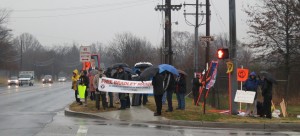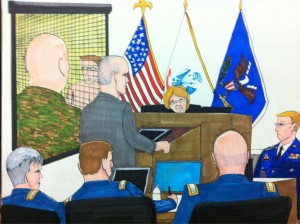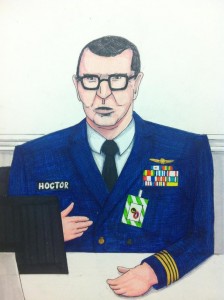Click on the headline to link to a Wikipedia entry for Frantz Fanon’s The Wretched Of The Earth.
Book Review
The Wretched Of The Earth, Frantz Fanon, Grove Press, New York, 1968
I have often had reason, when speaking of my long and painful trek to Marxism many years ago now, to note that the polemics of the third section of the Communist Manifesto, where Marx and Engels skewer the various left-wing political tendencies of their day for their short-comings, that I had probably espoused all the tendencies met there, or their modern day equivalent. That said, I have also noted that as a member (a member in good standing, by the way, meaning merely having survived the cultural wars of the past forty years or so and still standing) of the generation of ’68 I had run through all of the “theories” prevalent on the New Left (then New Left, now old and hoary with age) of the 1960s. They included such thread-worn “theories” as that the working class had then (and now by some new new left advocates) lost its central role (had sold out or been bought off in the vernacular of the times) as vanguard for socialism, youth as a class was per se a revolutionary agent for change (perhaps best known in the “red”university premise), guerilla warfare (rural as in China, Cuba and many African countries and urban as in the Weathermen, and its various transformations, creating a second front for those rural struggles, just then, the Vietnamese Revolution, as the central fact of late 20th century revolutionary practice theory), and most importantly for the discussion here black, blacks as an oppressed minority in the United States were, without question, and without questioning, the vanguard of the socialist revolution. And, one way or another, torturously one way or another, a nation with all that implied for self-determination rather than a segregated caste at the bottom of the main society.
One would think, given even cursory look at the condition of the international revolutionary movement today, and particularly its American component that that last premise would have been proved false by history and by reality. Not so. Recently I had occasion to attend a local planning meeting around the question of police harassment and surveillance of basically peaceful anti-war protestors who wanted to take action, rightfully so, to expose this nefarious activity in a public way. Fair enough, just put together a united front of all those from civil rights advocates, to the peaceful anti-war activists under attack, to the anarchists who right now are taking the brunt of police activity, to any other segment like immigrants, victims of the “war on drugs,” etc. who have come under the police dragnet, set a time, publicize the event(s) and you are off.
Well not so fast, not so fast by a long shot. Apparently, at least in some quarters, some old New Left and some new New Left quarters, whites, generic whites with “white skin privilege” (the basic component of that meeting) cannot move in their own defense without“waiting” on more oppressed (read: communities of color, but really black and Latinos) to chime in. So therefore no action was taken (except, maybe, more meetings to discuss this “theory”). So the old theories (granted in new clothing) have reared their very hoary heads. And sent me back to the books. Particularly to the grandfather of all such theories derived, somewhat unfairly and somewhat haphazardly, from Frantz Fanon’s seminal work, The Wretched Of The Earth.
Certainly if one merely observed empirically the thrust of revolutionary activity in the post-World War II period one would have seen vast national liberation struggles of colonial subjects from Algeria (Fanon’s revolution) to Cuba to Vietnam and everywhere in between to become free from the fetters of empire. And see, see in general, the relative decline of revolutionary activity by the Western working classes. Thus Marxism, or the parody of Marxism, was turned on itself to proclaim that new third world forces would create a new type of socialism (one based not on plenty since not frontal assault on the imperial centers after liberation was contemplated for the most part, but rather some ancient forms of societal existence, if any) led by new types of revolutionary organizations not tainted with the smell of sell-out Western and urban-centered communist and socialist parties or their colonial adherents, and creating a “new man” culture. But first the liberation, and the ethos of liberation.
Obviously such theories, based as they were on dismissal of the historic Marxist centrality of the working classes take state power and creating working class forms of economic and social life, could only work as theories of some military defeat of the imperial centers by revolutionary declassed intellectuals and lumpenproletariat elements freed from the land in third world countries. In short the creation of rural (or urban in some cases) guerilla armies guided by an ethos of revolutionary violence as cleansing its supporters in the process of knocking out the old order. In short, as well, a variant of the old Narodnik theories in the old time19th century Russian Empire that revolutionaries like Lenin and Trotsky had to fight against in their time.
The real problem with such lumpen-dependent strategies, borne out over time, and now in re-reading The Wretched Of The Earth, painfully borne out, is that the masses play no, or a passive role, in their liberation with all the distortions that a strategy based on a central military strategy creates. Revolutionary violence is probably, very probably, necessary to overturn imperial power but the cult of the gun, the cult of the purifying gun is not, and has not, worked in the struggle for a new socialist culture. The most dramatic example from the American left scene was the fate of the Black Panthers whose best elements (George and Jonathan Jackson, Fred Hampton, Eldridge Cleaver, etc.) bought into the Fanon substitutionist revolutionary thesis (the internal black nation theory they got elsewhere including early American Communist party doctrine on black self-determination as advocated by Harry Haywood and his fellows). And some very good Panthers wound up dead, wound up in jail (and some still in jail) and wound up cynical for their efforts. Let that example set in as you read Fanon’s very intriguing book, a book like I said earlier that was very influential in my own early left-wing thinking, and that of the generation of ’68.
Note: I would be incomplete in this review if I did not mention that Fanon, as a well-trained and extremely competent psychiatrist, spent a good portion of the book (the end section) describing the various traumas and pathologies ttributed to both the oppressed and the oppressor in Algeria during the national liberation struggle as a result of the colonial experience. He makes a very strong prima facie case for the proposition that oppression oppresses everyone and we had best get rid of this malignancy and take it off the human agenda as quickly as possible. To that I can say amen, brother.





